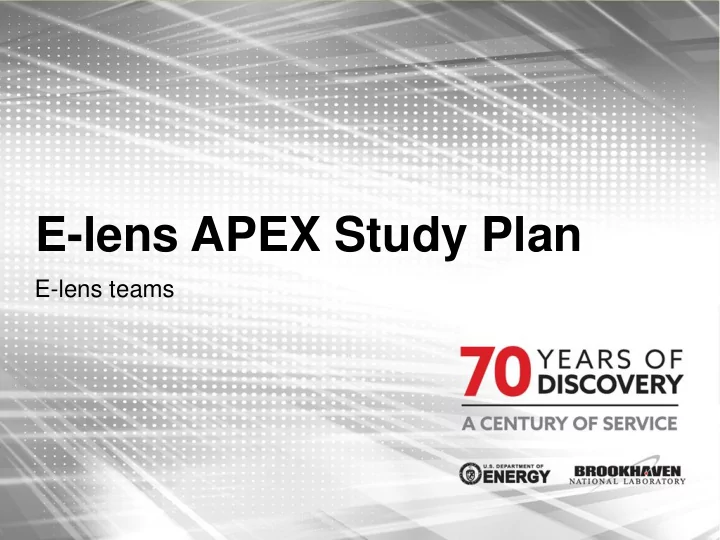

E-lens APEX Study Plan E-lens teams
HOBBC experiments at 255 GeV • Test of lattice • Dynamic Aperture (in operations with 1 BB collision) • Polarization and polarization lifetime (in operation) • Phase advance IP8 to e-lens (setup or APEX) • Effect of e-beam on p-beam tune distribution (BTF) Change in distribution with I e and s e • • BB footprint compression with e-lens Max beam-beam parameter x p with 2 BB • collisions and with and without e-lens Need maximum available x p , • i.e. N b ≥ 2.5 -3.0x10 11 with e n = 2.5 m m • ~28x28 bunches, short stores (~10 min) get data for plot like this (much fewer points) => • Measurement of BB Resonance Driving Terms • Test of beam stability
2017 lattice (yellow)
eBSD Alignment (Yellow) -0.3 mrad
eBSD Alignment (Yellow) Angle values in the Yellow alignment scan: A. hor scan: 0.0, +0.1, +0.2, -0.1, -0.2, -0.3, -0.4, -0.5 mrad At each step x-y position optimization with LISA. Set to -0.3 mrad. B. ver scan: 0.0, +0.1, -0.-1, -0.2 mrad (see increased losses at +0.1 and -0.2 mrad) At each step x-y position optimization with LISA. Set to 0 mrad
BTF 6
Summary 1. New store ramp pp17-elens0 instead of pp17-s0. Acceleration ramp unchanged. Measured optics for pp17-elens0 (Yellow should have multiple of 180 deg between IP8 and Yellow e-lens). 2. Turned on warm solenoids in both e-lenses. 3. Turned on electron beam in both e-lenses (~500 mA). Immediate signal in Blue and Yellow eBSD. 4. Position and angle alignment scan with the Yellow lens: Angle values in the Yellow alignment scan: 4A. hor scan: 0.0, +0.1, +0.2, -0.1, -0.2, -0.3, -0.4, -0.5 mrad At each step x-y position optimization with LISA. Set to -0.3 mrad. 4B. ver scan: 0.0, +0.1, -0.-1, -0.2 mrad (see increased losses at +0.1 and -0.2 mrad) At each step x-y position optimization with LISA. Set to 0 mrad 5. Current scan with BTF at final angle and position values (480, 390, 290, 190, 90 mA)
Recommend
More recommend